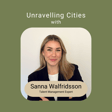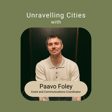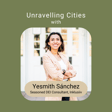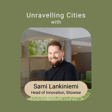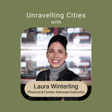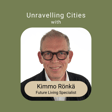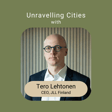Become a Creator today!Start creating today - Share your story with the world!
Start for free
00:00:00
00:00:01

Architects who started a software company
From architecture to the startup world – co-founders of CHAOS, Paloma Bautista and Natalia Rincón, share a special background and ambition to create liveable cities. In this episode, they share their stories and what they have learned on the journey.
Transcript
Introduction and Backgrounds
00:00:19
Speaker
So hi, my name is Natalia Rincon and I am a co-founder and CEO at Chaos. And my name is Paloma Bautista and I'm the other co-founder and I'm also the CEO at Chaos. Welcome. This is just like the first episode of our Unraveling Cities podcast. We felt that
00:00:42
Speaker
We should dedicate this episode just to present ourselves. Maybe you can tell something about yourself briefly so they know a bit about your background also. Who are these things?
00:00:53
Speaker
In schooling, I'm an engineering and computer science and architect. I have a candidate position for a PhD in Aalto University in smart cities. In my life, I've been working in a lot of places. My first job was at BlackBuster. Calling people to bring their videos, please. I've been in the city council here in Finland.
00:01:23
Speaker
sitting in boards like for urban planning, traveling, living in a lot of different countries in the world, studying architecture as well, working in architecture firms and urban planning firms and so on.
00:01:42
Speaker
Finally, I heard a calling. My dad is an entrepreneur, so I thought that I will never become an entrepreneur. And here I am with the same amount of risk that my dad has also taught me. So here I am. What can I say?
00:02:00
Speaker
I am an urge also and an extra urge. This is my confession. I love Excel and PowerPoint and I just open Excel right away when I had to do something. And if you tell me that when you have to do extra hours and Saturday to get this cashflow, no worries. I got just a cup of coffee and Excel and I'm relaxed. What about you?
Personal Journeys and Influences
00:02:28
Speaker
It's very magical somehow how you are all the way from Mexico coming to Finland. I come also from a remote place, but in Europe, in from Canary Islands. And then we end up here in Helsinki, like building all this, like who would have thought, you know, but about myself. So, yeah, I come from, for me, it's
00:02:53
Speaker
where I come from is a also very special place in my heart because it's well in Finland you all know Las Palmas but maybe you know the other side where you just escape the weather from here and go there and it's the warmest place like in Europe during winter and where we have the most hours of sun.
00:03:18
Speaker
Now this is a commercial for the tourism agency. But there's such a clash there. There's such a variety of influences because we are kind of in the middle of nowhere. They're floating, belonging to Spain politically. And so everything that goes with that and affects us. But then geographically, we are just near Africa. We also get all the sand from the Sahara when
00:03:48
Speaker
The wind blows, but then in our hearts also, because of generations migrating to Latin America, we have that Latin soul as well. So maybe that's also why we connect. Yeah, I find that a very kind of rich heritage in a way. I studied architecture, I studied back there in Spain. And then I think the moment where I opened my eyes and I felt like, okay,
00:04:17
Speaker
I already wanted to do something to make a difference, but didn't know exactly what. My dad was also an entrepreneur. And then when I worked for the consultancy, it's an engineer consultancy that serves the Ministry of Development in Spain. So they're in charge of all the public contests when you're building an airport or whatever infrastructure, public infrastructure. So for years, there's been the project in Canary Islands of building a train.
00:04:48
Speaker
It has a lot of opposition and it was a very interesting moment for me because it was where I actually ended up kind of grading projects and evaluating projects that also my former
00:05:02
Speaker
teachers in university were applying and so they were like these renowned architects and it's like now the wheels turn. Now I'm gonna make you cry. But no mostly it was because I saw the process of how a whole project is developed from the moment that it's an idea to when it actually goes to public consultation and people can say something about it which was too late and that's why the opposition
00:05:28
Speaker
Because no matter how great the conflict is, you're changing something that's been done in a way.
Unraveling Cities Podcast Concept
00:05:33
Speaker
And if you don't include people on time, you have an opinion, then you will just get them on the enemy side instead of on your side.
00:05:42
Speaker
So kind of that for me was like an important moment. And well, I ended up coming to Tampa where I met Natalia and then moved here to Helsinki when we started the company after a lot of commuting for a couple of months. But yeah, and I like everything that's creative. Like I actually, when I started, I was doing the marketing side when we were like four people. Now we are 13.
00:06:11
Speaker
And so I was very happy to be kind of designing the image of chaos initially and stuff like that. And I also like Excels very much. That's a shared value. Welcome to our first podcast. It's called Unraveling Cities. The reason behind the name is like we we made a competition like in
00:06:40
Speaker
like the team and everybody voted for names and we unraveling cities came as one the winner and it's of course something that it's very close to our hearts so we we for sure voted for that option because what we aim to do is to actually
00:07:00
Speaker
little by little, open the box of what a city is, which is a very complex Pandora box. And hopefully shed some clarity or maybe the opposite, little by little in these small podcast sessions that we will be having from now on. Yeah, I think you put it very well, like a city is very complex and
00:07:26
Speaker
speaking about what happens in a city, like you can spend, you know, a lot of hours just like sitting together and speaking about that. And maybe we tell you a bit also about why are we doing what we're doing here and who we are. And probably we connect with you guys and you're able to relate to our story.
00:07:53
Speaker
Yeah, I agree that I am super excited also to be doing this with you. I think we have a lot of experiences that we only keep between us. But I think from time and time, we get a lot of questions about how we are doing this and why and how to do it or how to start.
00:08:14
Speaker
and the challenges and everything that a startup comprehends. But I guess that also people are interested in
Building Chaos: Approach and Challenges
00:08:22
Speaker
our story. I think that's why we get a lot also of questions. So yeah, really happy and excited. So what is your story? Not that I have not heard it, but... My story is complicated and long.
00:08:41
Speaker
Don't make it sweet, I'm sure. Yeah. Well, maybe like how I ended up here in Finland. I just start from there and summarize it. But it was for love. And I think you and me share that. Yeah. And many other people that come to Finland. Those that don't come because of the weather, they come for love. Yeah. You don't come for the weather, it's love then.
00:09:09
Speaker
So, yeah, we are both here because we were imported to Finland and we decided to stay here. We initially, well, we both have a background in architecture. That was just super random and we were architects and that's how we met.
00:09:31
Speaker
Yeah, but I think that was key, actually. And a lot of people ask us that also, like, how come? Because Chaos is a tech company. Even if the name sometimes is a bit disturbing for people, Chaos Architects, it's more architects as, of course, somebody who builds something but not necessarily planning a building. It can also be an architect as in a software architect, which is actually what we do here. It's tech and it's AI.
00:10:00
Speaker
But I think that what, and we are from very different places, so still our experiences can be very different, but the architecture experience I think is something that you only understand when you have gone through the process. And what you get out from that is for sure resilience. Like you're able to, you have this huge drive, you are able to follow a vision through.
00:10:30
Speaker
I think maybe those are the qualities that are. Yeah, and I agree. I think that a lot of people misunderstand the word architecture. Of course, we always relate it to design of buildings. But architecture is the architect of a system, you know, like putting parts together, like of a system, a very complex system. And I think that I agree with you, like being an architect and studying architecture requires a lot of resilience.
00:11:00
Speaker
I have to be honest there's a lot of students that cry going through the process and but as an architect what I can I have also a bucket in computer science but I've never experienced the amount of workload that architecture brings in any other thing. Yeah same here and I think also
00:11:23
Speaker
apart from that resilience and that kind of hardcore working like mindset. It's also the ability to look at the big picture that we kind of there or I don't know if it's something that already it's in those people that want to follow that path, you know, and that's something that continues in the startup world that you have to really
00:11:46
Speaker
understand what's the vision and what do you want to pursue and sometimes get the energy from an unknown place to reach there. And survive only in coffee. Well, I'm not here to incorporate yet. But yeah, like, I think that's part of when going through the architecture courses, like, you really have to, you know, understand that it's a super big task. You're gonna, you're not gonna end up in or do it in one night.
00:12:16
Speaker
you have to work throughout the course, like one semester or so like in one project or even more semester, some courses are very long. It was like even nine months, like the whole year. Yeah. The whole year to make a project, a plan of complicated stuff, buildings like could be an airport or a metro or hospital. To get left at by the teachers in the end, but yeah. Most of the times, like really like listening to harsh feedback
00:12:47
Speaker
Maybe that's one of the things that architects learn, like a lot of times know, like to hear the word know and get comfortable with the feedback. That's true. And you know also what else I think, because when you have to design, you have to design for others. You have to really leave sometimes your own opinion aside to understand what the end user
00:13:13
Speaker
it's really needing and the end user it can be if you're doing urban planning it can be all of us as citizens or it can be just one person like having
00:13:25
Speaker
project for a building or like their home. And I think that's super important also here like in any business to understand the customer. Exactly. I think you put a good point there because so much rhetoric that we hear in the architecture course is about understanding the user.
00:13:45
Speaker
like who is a user, why? There's some architects, famous architects, Mies van der Rohe was, that went to leave, whenever he
Co-Founders' Dynamics and Startup Life
00:13:52
Speaker
had like a project, he went to leave with a family because the users were asking certain things, you know, having design homes and minimalist things. But then when he noticed like, what was like how they use the home, then he proposed something different that the family was asking.
00:14:13
Speaker
because he studied what were their, you know, schedules and habits and how did he spend time. So I really liked that. And it's true. In a startup, we hear these rhetoric that you have to understand the customer. What do they really need versus nice to have? Or even what they want. Yeah. And can they express what they really need? So I completely agree. It's like you always have to put the architect, I think,
00:14:43
Speaker
graduates with the mentality that you have to understand the other one. So are you proposing that we move into our customers homes? We should just like be there one month you know sitting like hearing the asset managers and at least like what are you
00:15:02
Speaker
But you know, that is like a lot somehow what we did when we started. I mean, we didn't invade anybody's privacy, but we had a lot of these workshipping and brainstorming with the customers. And I think that that was a privilege. I don't think that's something that every company gets to do. So we had quite, I don't know if we like picked the right people or what is it, but how they opened
00:15:30
Speaker
us also and how they were willing to tell us their pain and then that we were we were like psychologists asking all the questions like what is it exactly that you need and do you have this and why and why and why and why and only that way you get to actually provide a service that then is actually useful for them so yeah I completely agree with that but maybe I want to make also
00:15:58
Speaker
a comment there going back to when we started. I think not everybody's really lucky or blessed to find like a co-founder that shares so many good ideas and also bad ideas. Yeah. Ideas in general. And I think when we met,
00:16:26
Speaker
We both were in that moment of life that we wanted to do something else. Like that we kind of knew that architecture as in drawing forever was not enough. Yeah. How to make an impact. I think was the little thing in our heads. Yeah. How to make an impact. And maybe with that mentality of people and the users, you know, that how to help broader in a broader spectrum and faster or to more people, like reach more people.
00:16:57
Speaker
Maybe that's, I think that's one thing that kind of glue us together. Yeah, for sure. And I mean, it's much like.
00:17:06
Speaker
I guess like a romantic relationship also. Like if, if anybody's wondering, what's the first thing I should do to start up my own like business or something, I would say that choose who you're starting it with super carefully. And because I feel like Natalie and I, like we share values. I think that's really crucial, but then we have very different personalities that compliment each other. So I think that's the beauty of things.
00:17:34
Speaker
Yeah, and I completely agree. Things that I hate about myself and then I see, you know, strengths in you and I'm like, yes, like, this is what I'm speaking about. So, yeah. So just carefully who you are. I like or sound like a mother. Just carefully who you're going with in your own life.
00:18:01
Speaker
And I also think we did something if we think back to the very beginning. So when we speak about the beginning, it's 2017.
00:18:10
Speaker
when we kind of formalize things. But actually, when we started, we were already having the ideas, but we had not created a company as such. And I think that was, I don't know if it was that we did it like consciously back then, but I think it was a very good way of doing things when I look back because it's very hard also to get everybody committed to something that's so long term.
00:18:36
Speaker
And there's going to be a lot of failure and again and again. And the way that we started with the kind of association, how is it in English? Co-operative. Yeah, co-operative allows a lot of flexibility until you are actually knowledgeable enough to say, OK, now this is what I want to kind of make official. And then we have to do a liability company, an LLC.
00:19:03
Speaker
But I think that may be also a good point in that because I was also a listener. I mean, that's a good way to start because you don't have all these tough agreements like in the shareholders agreement. But I think maybe I wonder if that was something to say, you know, because in Finland, at least in the local environment, when you start a cooperative and then you transform that into an LLC, the years count. You're then an older company.
00:19:33
Speaker
even though you just made a transformation. So that has affected us somehow when we say like, how old are you? And then you go to the public registry and say, well, we have X amount of years. But then you say, actually, our operations only started this year. That is very true. And yeah, it's quite the opposite of everything else in life. So normally age doesn't matter. It's a number, but not when you're doing business, unfortunately. So when there's key, I would say key.
00:20:03
Speaker
years or milestones. And five years is one of those like when you're already five years expectations. Yeah, exactly. And maybe also one thing we could have done better. So we're building this complex product, which is requires a lot of deep tech, heavy, you know, machine learning, and a lot of data like big data. So a lot of state of the art tech and
00:20:30
Speaker
It's not just like a visualizing something, but I think that we were conscious about that. And that's why we did a lot of meeting customers and trying to figure out that is this that we are building the idea, like something that we, are we thinking straight and can we validate with the customer? So I think the process that took us like some years of bootstrapping, I think maybe we should have,
00:20:59
Speaker
had clearer way, you know, like, okay, this is like bootstrapping, and that's it, and maybe a different way to organize your own operations. I don't know. How do you feel about that? Yeah, of course, like now, after five to six years of experience in the business, you would go back and do things. Sometimes not so much differently, but maybe with the knowledge that you have, they would be faster for sure.
00:21:28
Speaker
So I think we could have done what we did in a shorter period of time. But I'm very thankful that we got that kind of customer relationships that helped us validate the product that now it's very solid and a market fit. Yeah. But what other things can you think that was like a listen? Well, we have a lot of listens learned to share.
00:21:55
Speaker
If we just continue a bit more with this customer understanding, I would say that once that you think that you have understood the customer, then still you haven't. Ask more and continuously. And it's not like, oh, check. It's a continuous process. And it's your choice in a way to make them your best ally. And I think also that if you nurture these relationships,
00:22:25
Speaker
they will help you like get to where you want to get with the company. But it's also true that sometimes it can be very painful that you have to be ready to receive really harsh feedback and well, basically just people. Yeah. And maybe sometimes it's not harsh. Maybe it's just the answer or like the feedback that you don't want to hear. It's not necessarily harsh. It's more like we don't have a need for these, you know, and
00:22:54
Speaker
they're as polite as they can be and, you know, they try to work with you. But then as a founder, which I think is also a challenge for most founders, is that taking the feedback that you don't have a good product, you know, like have a good idea. So I think it's more like an ego thing or pride thing. So totally you have to leave that aside and question a lot and ask the team, like, are we doing the writing and ask the board and ask everybody a question yourself?
People-Focused Urban Planning
00:23:22
Speaker
Maybe one of the lessons, I mean, in all the gamma of lessons that we have had, just based on this topic, it's maybe preparing the team to, you know, receive these, be ready to take no hundred times.
00:23:41
Speaker
And then maybe 1% of the time the ES is going to come. So the mental preparation of the team, I think we should maybe have spent more time in that. Or is something that maybe you don't learn until you just experience it, right? Yeah, maybe it's just a bit of the mindset of having studied architecture, receiving the thousand nos. But yeah. But then at the same time, I think something
00:24:11
Speaker
I hope that we have managed that and maybe it's more like the team that has to answer than us, you know, but actually making like doing business, but keeping the human touch in everything we do. And maybe this goes back to link to the customers. Like if you at the end of the day, you just really think like everybody's a person and everybody's having their stuff.
00:24:32
Speaker
Going on and you connect with them and you connect with your team with individual behind whatever it is Is it a VC or there's a person there? So really be open in that way and like to connect and I I hope that
00:24:47
Speaker
We have managed to do that. It's a hard thing to balance. I think that juggle this. This is a business that we have to make business. And at the same time, is everybody all right? You know, and like everybody's having their personal matters, ourselves included. And we want to care of everybody. But of course, there has to be limits. So that's a very complex equation, I think. Yeah.
00:25:16
Speaker
And brings us back to the purpose, like why we started this, it was about people. Exactly. So maybe as architects, we discussed a lot that again, like trying to understand the end user of a building. This was not very well done in architecture. When planning a building or a concept, there's still a lot of manual things that are happening, you know,
00:25:41
Speaker
you stand out of a shopping mall and see how many people are entering and how they're walking and count them, you know? That was a very architecture practice. Yes. But it was just somewhere unobserved. Yeah. Yeah, exactly. We had a lot of those things. And like, how are people experiencing this space? And that's how we started. Like, cities should be better for people. Like, we are not observing them enough. Yeah. That sounded creepy. But actually, it is how it started.
00:26:09
Speaker
then we just figure out like okay there's better ways with the technology that we have in hand and the data that we have in hand there's better ways than doing this so manually and so in individual cases so that's where the big data comes in. And then we were also biased because I think that's like the beauty of big data that I might have an opinion and I think that hey we need benches in this park
00:26:35
Speaker
someone else might say that, no, it's not benches, it's like trash bins or whatever. And I think that the beauty of big data, as in a democracy, or any participative process, is that you're actually taking into account all the neighboring services and all the neighbors of a space.
00:27:02
Speaker
And then say, what does, what is the thing that benefits everyone in that community the most?
Aligning Profit with Impact
00:27:10
Speaker
I disagree with that. The collective thinking and like it becomes less individual. And that's also a question that we have gotten a lot in the past, like, so you're tracking people. It's not at all. That's not even useful for anything. We need to understand masses. We need to understand behaviors.
00:27:27
Speaker
We need to understand the need, is there a demand for something? So we don't end up, and I say we, like everybody in the urban development process, building cities that are for nobody, that are ghost cities. Yeah, I think that's one of the values we share since the beginning.
00:27:46
Speaker
that we are not okay just building empty buildings and as architects, I think both like sustainability is quite embedded in our practice. So we get this feeling that why are we putting trees down and bringing concrete and building something that it's not going to be inhabited. So yeah, going, it's all about people and how do you make a business profitable out of that, you know, like,
00:28:16
Speaker
How can making the world better be profitable? Yeah. And it sounded when we started with this rhetoric, we got a lot to comment like, this is very romantic idea. And it's like, we're fine with that. Yeah, it might be romantic. That's part of it. It's inherent of us also, believing in a bigger thing and in a better way of doing things and improving things for everybody. But it's doable.
00:28:46
Speaker
I mean, if not now, like when, with all the tech that we have, like it's more about mindset actually. And I think we have some wins in our favor because with all these, you know, crises that we have been experiencing, the silver lining of that, he said, it kind of brought a lot of stakeholders from the industry realizing that we actually have to make a change.
00:29:13
Speaker
maybe not motivated by the same thing. Or maybe, yes, I think I want to believe that as humans, we are all motivated to do good. But sometimes, of course, business interest steps in between because you don't know how to marry both ideas. But with the crisis, I think all the stakeholders are trying to bring those two ideas to coexist that you can make a good impact and you can have a good business. Yeah.
00:29:51
Speaker
So what do you think are like the most memorable moments so far? For us, I always remember when we got our first office in Maria's Euro One, the startup hub or innovation by campus.
Team Building and Investor Relations
00:30:12
Speaker
Um, and where it's an old hospital, 130 year old hospital, maybe now it's 135 year old. Um, and we were wearing, wearing helmets. That's how we entered first time, the office, because it was necessary. Like the place was still in mid sun pieces, but we were super charmed because I think that we also believe in this kind of retrofitting idea and
00:30:40
Speaker
like rescuing, like repurposing, like seeing the potential. And then there was a community being built there. So we were also lucky to get the Maria project from the start. So in parallel, like the community and the whole innovation center was growing. And then we were also developing our, our projects here. So that I remember like very fondly and also traveling from town all the way there when I was still living there. So yeah.
00:31:10
Speaker
the opposite or the other memorable thing is when we actually went out and then we I remember the memorable thing is that when we brought the team to the new office which is super nice we brought them and they said finally an office that I can feel proud of yeah and then you're thinking okay so we are moving in the right direction but
00:31:39
Speaker
Yeah, overall, is there something else that you remember? Well, signing the first shah. So actually getting the first investors on board, also, on formalizing everything. That meant that we are not just two crazy women. And there's support behind them that we are making some sense, at least. And yeah, that was quite meaningful moments. And many moments.
00:32:09
Speaker
building the team, actually seeing people from outside also wanting to join the team, seeing the attraction, how they feel, all that. I feel so proud of everybody here. This is one of the questions that we get a lot, like how do you form a team? You're working very closely with recruiting and operations. You know what, actually, when I started hiring myself,
00:32:39
Speaker
So I was the person in charge of the hiring here already five years ago.
00:32:46
Speaker
It goes back to that point because I remember the suffering of having to tell no to a person that I actually thought it was really valid to many people, but it's just not a match. And it's not, it's nothing personal at all. And they're still great and they have great skills, but it's just like, again, like getting married or something like it's, there's this one thing, I don't know what it is. Also for people that might be hearing us and having been rejected from interviews or something, like there's nothing wrong with anybody, like, yeah.
00:33:16
Speaker
That's how it goes, fortunately. Yeah, and remembering the real persons.
00:33:23
Speaker
like in different stages of life as well. Exactly. So the startup ecosystem or life is challenging. It's not for everybody. And I don't think there's better people than others. It's just like you have different tastes, you know? Yeah. And it's very, very high pace. That's true. Like it's something that we also try to be making everybody aware that maybe you
00:33:49
Speaker
And we have gone through that. We have a lot of moments also where.
00:33:54
Speaker
you and me have to put a lot of extra hours and weekends. And it's like, I really think we share that attitude that no questions ask, let's do it. And I think that has been crucial for both, that you have someone that feels like that, that you don't even have to explain that we have to do this. So that has been key.
00:34:21
Speaker
So thank you for all the extra hours. Maybe from my side, one of the things you deal a lot with the team that is in-house and operations. I deal a lot with the team that we are recruiting to invest. We have this thing with a whole team. I think Chaos family is the team that is working here, making things happen in the operation.
00:34:49
Speaker
But then the team that is cheering you up from, you know, how do you say these las gradas? From the side of the court, like, you know, in sports, and they're cheering you up and they're giving you feedback and
00:35:08
Speaker
they're yelling at you like go for the ball like don't stay there or you know run or and I see our investors and shareholders and board members and advisors like that so they're very tough but they're great I mean their advice is so professional and
00:35:30
Speaker
We have had to reject some like investors in the process, maybe no startup things about that, that be very careful of the kind of investors that you're bringing into your cap table, they're owning your company. We have had those situations where we have to say that we don't have money, but maybe no thanks, you know. And the ones that we have, yeah, like I think they have been sticking to us
00:35:58
Speaker
pushing us, cheering and then giving feedback. I think that has been very important as well. I think that thinking about people again, because this is very important for us, it's like giving the recognition of like to everyone, both sides, you know, the team, the players in the game and the coaches, you know, the ones cheering there for you.
00:36:27
Speaker
it's a team work, no one gets to where they are alone. And we are living proof of that. That is very true, because motivation is always like it's something that you have to, it's like showering. You have to do it every once in a while, you know, it's not just like a journal. And there's it's fine, like there's days that you're like, fuck, sorry, I'm not allowed to see. Or am I?
00:36:54
Speaker
Well, but then that you're just thinking like, what, why did it get into, you know, or like the huge responsibility, it's a huge risk also. But then there's the other person reminding you why you did that. Yeah.
Vision for the Future
00:37:08
Speaker
And then the other way around. Yes, exactly. It goes back and forth.
00:37:18
Speaker
how do you see like moving forward like where do you see chaos five years from now like what do you want to maybe i'd ask you like that what are we gonna get in five years well i already see chaos like that so maybe it's like other cks as this european top-notch player that is the place to go wherever whenever you're
00:37:47
Speaker
wondering about a location and the people in that location and you have some questions, then you know you go there. The same way that you go to Google right now whenever you have a question, a very easy place to go to to understand more about changes in a city and about how things are, how your decisions would impact your surroundings and other people and the city's livability all in all and sustainability and like the big picture, you know.
00:38:18
Speaker
So being recognized as that player, that is what I'm envisioning. I agree. I think that it's super important. We share the same vision. It's like having this go-to solution that everybody thinks about, like, oh, I want to know something about this place. And then chaos comes to your mind.
00:38:41
Speaker
that for me, like the users are really using it and finding it useful, you know, our customers. That's like, that's highlights during our days. And we've heard different stories from our own team, like we are a lot of foreigners here. So we come from very different parts of the world everywhere.
00:39:00
Speaker
and we've been through their process as well you know when they go to their home or the kind of job they left home and they came to Finland or when something is happening in their family and what kind of values the families have also in their hometowns you know and how their story is also affecting their family
00:39:23
Speaker
So it's like a lot of a ripple effect also, if you really see all the things that are happening. You touch a lot of lives. Yeah. That's again about people. Yeah. Yeah. It's always about people. No matter how complex your technology is, it's always about people.
00:39:53
Speaker
We could do this forever and with a glass of wine even longer. But it's 11.46. Maybe it's already good for a glass of wine. So final question. This maybe we will repeat eventually also with the other ones. And I ask you, or do you want to ask me that? I will ask you. I will pick your brain. So yeah, if there were no limits at all,
00:40:22
Speaker
What kind of innovation, technological innovation would you invent to make life easier in the city? Teleportation. I've heard this answer somewhere before in other questions. And I think that that's amazing. Like just cutting the commuting time, you can mean any city in the world. You know, that would be really cool.
00:40:46
Speaker
I was actually just thinking about having to go to the car to change the parque quieco, like the disc for the payment. That would already be a good app for me or a good system, like something that does that automatically. But if I can teleport there and back, then that's also good. I wouldn't even need a car in that sense. I could be having my mom's dinner on the weekends and then come back and say, oh, I had a very good next day. No CO2 emissions. Yeah.
00:41:21
Speaker
listening to podcasts when commuting. Yeah, we would have to make two second podcasts. Yeah, yeah, yeah, we didn't speak about how long the teleportation would be, you know, like maybe it takes one week for you to really form in the other side. And then you're missing an ear or like, yeah, just perfecting a technology. Yeah. Yeah, cool. Maybe I will think about this and come back with other things. I think that's something very important that
00:41:39
Speaker
But then what about singing in the car? I like that. We're reading in the trams.
00:41:50
Speaker
we touched at some point was this collective thinking. And I don't know what that looks like in technology, but something that would make it easier for all of us always to see that kind of the other side. Just as an individual, but how am I affecting or so you're able to put yourself in other shoes? And I think that's so key to to also understand your own impact in order to make the decisions that you're making that you can then sleep with. Yeah.
00:42:19
Speaker
I agree. I'm kind of technology for that. All right. But we've come to the end of the podcast. I hope you enjoy really that you're not just here bored. Yeah. Thank you. And I hope that you tune in next episode. Yes. Here in traveling cities. Thank you. Goodbye.
